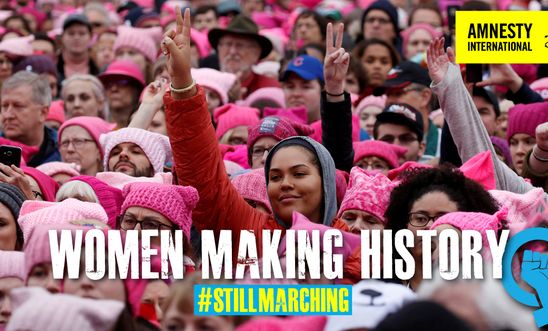
Press releases
Worldwide Wikipedia edit-a-thon writes unsung women heroes into history

Less than 20% of Wikipedia biographies feature women
Hundreds of online activists from more than 20 countries will edit and fill the “glaring gap” of women human rights defenders on the global encyclopaedia
People across the world will take to the internet this weekend (19 and 20 May) to write women human rights defenders into history as part of Amnesty International’s first worldwide Wikipedia edit-a-thon.
BRAVE:Edit, in collaboration with Wikimedia (Wikipedia’s non-profit organisation), will see hundreds of activists from more than 20 countries take to the global encyclopaedia to upload biographies of women human rights defenders who have devoted their lives to fighting injustice and yet are absent from the online archive.
Currently, less than 20% of Wikipedia biographies feature women. The work of women who tirelessly campaign for human rights, often at great risk to themselves, continues to be underrepresented and insufficiently recognised by mainstream society, policy makers and the media. Very little public information is available about the incredible work they do, and what exists is usually limited to specialised platforms.
A tech-hub will be set up in London this Sunday (20 May), where activists will be participating in the Wiki-edit, as part of Amnesty‘s one-day festival celebrating women human rights defenders, Women Making History: #StillMarching.
Guadalupe Marengo, Head of Amnesty International's Global Human Rights Defenders Programme, said:
“There are more than five-and-a-half million entries in the English language version of Wikipedia alone, on the most disparate subjects. However, less than 20% of biographies are dedicated to women, with few devoted to the important work of human rights defenders, and even fewer to women human rights defenders.
“BRAVE:Edit hopes to fill this glaring gap. These are stories of some truly inspirational women who have overcome huge obstacles and fought entrenched discrimination in defence of human rights. Activists from across the globe will be helping to bring them to a worldwide audience where they belong.”
The work of women human rights defenders often breaks new ground, as they continue to challenge power and harmful social norms. However, these same norms mean women often face more discrimination than their male counterparts. As individuals, they are considered less worthy because they are a woman, an LGBTI person or because they work on issues related to gender and sexuality. They are also at risk of violence, sexual attacks and harassment.
John Lubbock, Communications Coordinator at Wikimedia UK, said:
“Working with Amnesty’s global community is a chance for Wikimedia to reach out to new audiences to encourage them to become involved in the creation of knowledge about their identities and histories, and to make sure that women human rights defenders are given the importance and prominence they deserve online.”
Wikipedia is visited by 1.4 billion unique devices per month, but only a fraction of its users edit the content. Globally, only around 50 per cent of people have access to the internet, and the people who most frequently edit Wikipedia are usually white, European or North American and male, so the content tends to reflect their interests. BRAVE:Edit seeks to encourage more diversity in editors and create more content about different identities to better reflect the world we live in.
Examples of women being written into wiki-history
Maryam is a prisoner of conscience in Iran. She was arrested in 2009, forcibly disappeared for five months, and is now serving a 15-year sentence after being convicted of “enmity against God”. Throughout her detention, she has continued to campaign by publishing open letters about prison conditions for women. Maryam also filed a formal complaint demanding truth and justice for several thousand political prisoners who were victims of extrajudicial executions in 1988, including her siblings. As a result, she has been threatened with an extended prison sentence and denied medical care.
Elena was forcibly sterilised in hospital right after giving birth to her second son in the Czech Republic – she had not given her informed consent to the procedure. Her experience spurred her to join other women and campaign to end this horrific practice and the discrimination of Roma women.
Joeli is founder of ‘Pregnant Then Screwed’ in the UK, a project which protects and supports the victims of pregnancy and maternity discrimination and campaigns for cultural and legislative change. Joeli works to break down the inequalities women encounter from the point they get pregnant.
Polly set up the Sharan Project to support Asian women exposed to abuse and gender-based violence in the UK. The Sharan project provides ongoing support for women and helps them rebuild their lives. Polly works tirelessly for this cause, providing resources that empower women to make informed choices about their future.
BRAVE:Edit is part of Amnesty’s Brave campaign, which aims to strengthen the recognition and protection of human rights defenders around the world.